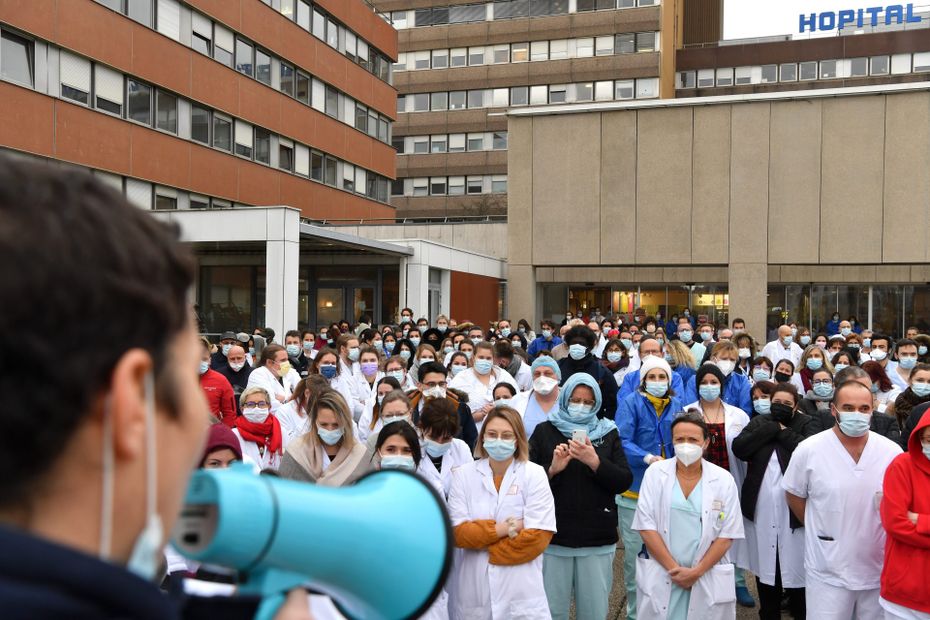After going to a match in Nîmes by train and not in a supervised bus procession, around fifty Racing Club de Strasbourg supporters were deprived of away matches in 2019. These administrative stadium bans ( IAS) were all deemed illegal and the prefecture had to pay 6,600 euros.
On March 16, 2019, 88 Racing Club de Strasbourg supporters were arrested at Nîmes station. By going to the match by train from Avignon, they partly violated a prefectural decree which prohibited several places “anyone claiming the quality of a supporter” of Racing and “behaving as such” to come to the match by their own means. and to circulate in several places of the city. The supporters had however hidden any sign of belonging to their favorite club. They were all taken to the Nîmes police school and then sent back to Alsace without attending the meeting.
The story could have ended there, but in the summer of 2019, 49 of them were notified of an administrative stadium ban (IAS) by the Bas-Rhin prefecture. A measure of deprivation of freedoms without judgment pronounced by the prefecture with regard to individuals permitted by successive laws against terrorism. When Racing traveled from August 2019, supporters had to report to the police station near their home (read our article). After negotiations with the club, the arbitrary ban, envisaged for 6 months, had been reduced to 3 months.
Ban overturned once, then on appeal
Three years to the day after the mass arrest in Nîmes, the supporters’ group Ultras Boys 90 (UB90), announced that all IAS had been deemed illegal. In August 2020, only 2 of the 49 IAS had been validated according to the administrative court of Strasbourg, the others being invalidated. But the majority of those concerned, 44 supporters, had appealed all the same. Because in the first instance, the prefecture had not been ordered to pay the legal costs to the winning party.
On September 20, 2021, the Nancy Court of Appeal confirmed the illegality of the measure and, as the supporters hoped, it matched its decision with 150 euros in legal costs per individual. “In an individual case, there are generally 1,500 euros in irrecoverable costs, there there was a form of pooling since it was the same facts, presented several times”, explains lawyer Pierre Barthelemy, specializing in fan issues and who defended all Strasbourg issues. Or 6,600 euros to be paid by the prefecture of Bas-Rhin. Costs “paid to the lawyer who struggled to defend us”, according to a press release from the UB90.
The appeals “force the prefectures to pay money”
These appeals may seem futile, since these prohibitions are canceled long after their effects by the courts. But there are three objectives, explains Me Pierre Barthélémy:
“These decisions feed the case law and therefore make it possible to defend oneself against the administration when a supporter is targeted by an IAS. In addition, an IAS is for a maximum of 24 months and can be extended to 36 months if it is repeated. So canceling it no longer allows it to be invoked when a new procedure sanctions “general behavior”. Finally, this obliges the prefectures to pay money. They don’t have a big IAS budget so that can create internal resistance. If they have the assurance of losing and put in parallel all the work that this will generate, such as producing a defence, the legal services can curb the demands of the police. »
Because in the case of the UB90s, the lawyer points directly to the responsibility of the police:
“There was a sort of personal vendetta. The police who are used to following the supporters told them straight in the eye that they will make them pay for their gesture and that trust was broken. It is not well explained why only some of the participants had an IAS, it can be assumed that the policeman gave the names of all the Ultras boys he recognized and that the other people were not members of the UB or came exceptionally. »
” data-medium-file=”https://www.rue89strasbourg.com/wp-content/uploads/2022/03/805bd21e-3ec8-41ac-9200-edd437ff4e76-280×373.jpeg” data-large-file=”https://www.rue89strasbourg.com/wp-content/uploads/2022/03/805bd21e-3ec8-41ac-9200-edd437ff4e76-630×840.jpeg” loading=”lazy” width=”630″ height=”840″ alt=”” class=”wp-image-229929 jetpack-lazy-image” srcset=”https://www.rue89strasbourg.com/wp-content/uploads/2022/03/805bd21e-3ec8-41ac-9200-edd437ff4e76-630×840.jpeg 630w, https://www.rue89strasbourg.com/wp-content/uploads/2022/03/805bd21e-3ec8-41ac-9200-edd437ff4e76-280×373.jpeg 280w, https://www.rue89strasbourg.com/wp-content/uploads/2022/03/805bd21e-3ec8-41ac-9200-edd437ff4e76-768×1024.jpeg 768w, https://www.rue89strasbourg.com/wp-content/uploads/2022/03/805bd21e-3ec8-41ac-9200-edd437ff4e76-1152×1536.jpeg 1152w, https://www.rue89strasbourg.com/wp-content/uploads/2022/03/805bd21e-3ec8-41ac-9200-edd437ff4e76-1536×2048.jpeg 1536w, https://www.rue89strasbourg.com/wp-content/uploads/2022/03/805bd21e-3ec8-41ac-9200-edd437ff4e76-scaled.jpeg 1920w” data-lazy-sizes=”(max-width: 630px) 100vw, 630px” src=”https://www.rue89strasbourg.com/wp-content/uploads/2022/03/805bd21e-3ec8-41ac-9200-edd437ff4e76-630×840.jpeg?is-pending-load=1″/>
” data-medium-file=”https://www.rue89strasbourg.com/wp-content/uploads/2022/03/805bd21e-3ec8-41ac-9200-edd437ff4e76-280×373.jpeg” data-large-file=”https://www.rue89strasbourg.com/wp-content/uploads/2022/03/805bd21e-3ec8-41ac-9200-edd437ff4e76-630×840.jpeg” loading=”lazy” width=”630″ height=”840″ src=”https://www.rue89strasbourg.com/wp-content/uploads/2022/03/805bd21e-3ec8-41ac-9200-edd437ff4e76-630×840.jpeg” alt=”” class=”wp-image-229929″ srcset=”https://www.rue89strasbourg.com/wp-content/uploads/2022/03/805bd21e-3ec8-41ac-9200-edd437ff4e76-630×840.jpeg 630w, https://www.rue89strasbourg.com/wp-content/uploads/2022/03/805bd21e-3ec8-41ac-9200-edd437ff4e76-280×373.jpeg 280w, https://www.rue89strasbourg.com/wp-content/uploads/2022/03/805bd21e-3ec8-41ac-9200-edd437ff4e76-768×1024.jpeg 768w, https://www.rue89strasbourg.com/wp-content/uploads/2022/03/805bd21e-3ec8-41ac-9200-edd437ff4e76-1152×1536.jpeg 1152w, https://www.rue89strasbourg.com/wp-content/uploads/2022/03/805bd21e-3ec8-41ac-9200-edd437ff4e76-1536×2048.jpeg 1536w, https://www.rue89strasbourg.com/wp-content/uploads/2022/03/805bd21e-3ec8-41ac-9200-edd437ff4e76-scaled.jpeg 1920w” sizes=”(max-width: 630px) 100vw, 630px”/>
–
The disappointment of the new law
While “75% of IAS are broken by justice”, supporters’ associations hoped for an evolution of these exceptional rules after a parliamentary report by Sacha Houlié (LREM) and Marie-Georges Buffet (PCF) welcomed by the community. But for Pierre Barthélémy, the consecutive “Sport law”, voted at the start of 2022, has not changed these questions:
“Contrary to the initial promise, about 80% of the subjects were skipped, it was just to say that a law was made. This is a huge missed opportunity because the parliamentary report was very comprehensive with very concrete proposals. We were very disappointed by the Minister of Sports Roxana Maracineau who prevented all the amendments, without really developing arguments or showing that she understood the subject. »
Laws relating to sport being rare in the National Assembly, supporters will have to resume lobbying work so that a niche is granted to the IAS during the future five-year term.
–

